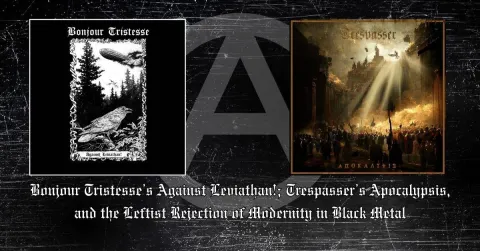
From DIY Conspiracy
Trespasser’s Ἀποκάλυψις, and the Leftist Rejection of Modernity in Black Metal
Punishing new albums by Bonjour Tristesse and Trespasser exemplify black metal's tradition of rejecting modernity, while envisioning a more sustainable and equitable future.
ince its inception as a genre, black metal has associated itself with extremism. Extremism in sound, first and foremost. Blast beats, blurry riffs, throat shredding vocals, raw recordings—whatever could make the music as indigestible as possible. But, of course, parallel and complementary to this sonic punishment was ideological extremism. No one needs yet another recounting of the beliefs and crimes of the early black metal scene, and I feel safe assuming that anyone reading this has at least a cursory knowledge of them, but they’re worth bringing up to note that these early events set black metal on a specific socio-political trajectory, a trajectory that at least some black metal still holds. I’m not necessarily talking about racism, per se, though some black metal bands have obviously gone in that direction. That’s just one part of a larger picture. Rather, I’m talking about how the extremism of black metal has manifested as a vehement rejection of modernity.
Viewed through this prism, much of black metal’s aesthetics and ideology make sense. Raw, punishing recordings layering shrieks and bellows over a morass of virtually indistinguishable instrumentation representing a performative renunciation of the slickness of modern music, paired with an obsession with the pre-Christian, pagan roots of Scandinavia and a skepticism towards the increasingly globalized, urban, cosmopolitan world. The whole genre could be read as a critique of the past thousand years, give or take a few centuries.
Any popular idea about history is, of course, as much about now as it is about the past. Metalheads wearing leather jackets and denim jeans, buying CDs and tapes at record stores, playing music on electrified instruments, touring in vans, and enjoying the comparatively high standard of living in Western cities while screaming about rejecting modernity and glorifying ancient, pagan ways are obviously engaging in a bit of theater. I’m not critiquing or mocking this. We all do this. All politics are performative, to a degree. Rather, I’m highlighting that black metal is an aesthetic project that, like any movement, has long engaged in a kind of identity-building and meaning-making using the tools of the genre to valorize salient elements of the imagined past while critiquing certain aspects of the very real present.

But, like all music genres, black metal is not one thing, and its aesthetics and values can be repurposed towards many ends. If what black metal has offered is a radical rejection of the modern, there’s no rule that says what that has to look like is a celebration of northern European paganism, shot through with a nihilistic misanthropy, occasionally coupled with a sometimes-explicit, sometimes-implicit white nationalism. Or, to put it bluntly, if black metal aesthetically and ideologically rejects the modern, there are dozens of different ways to embody those beliefs.
Some current black metal bands, such as Blackbraid and Pan Amerikan Native Front, embrace the implicit anti-colonial ethos of black metal, but repurposes to be about Indigenous Americans casting off the oppression of white colonizers. Some current black metal bands, like Panopticon, Feminazgûl, Gravpel, Yovel, and Dawn Ray’d, use the bleak rage of the genre to promote the overthrow of hierarchies of oppression, interrogating the dominant understandings of race, class, gender, religion, and sexuality as they have been presented for the last several hundred years.
And some black metal bands challenge the entire grand edifice of contemporary civilization itself.
If one wanted to, one could view the modern world as a cruel, perpetually whirring machine that, through the twin powers of the state and the neoliberal, capitalist order, imposes an unnatural individuality on us, breaking our communal bonds and stripping us of our ties to the land. In an endless project of enriching the wealthy and privileged, modernity builds ever more efficient engines to tear at the soil, dragging natural resources out of the ground to burn for its comfort, choking the land and the water and the sky as it does so. But, the captains of industry who profit off this engine aren’t about to work themselves to death building and piloting the machines, of course. They leave that to the rest of us, erecting political and economic systems which keep us ceaselessly running and fighting to survive off the crumbs they drop from their banquet tables for us, as we kill ourselves working for their pleasure and power, trained to see our potential comrades as competition based on the myriad borders and boundaries they have drawn over us to keep us from realizing how much more we have in common with each other than we do with them. And, ultimately, we’re the ones who will suffer the most when they fully bleed the earth dry of all its bounty, leaving it a dead, scorched husk.
As far as writing a black metal song goes, that is a much more thorough and accurate critique of modernity than most, and few black metal bands have more ably deployed this analysis than Bavarian project Bonjour Tristesse and Swedish band Trespasser.
Bonjour Tristesse – Against Leviathan! (Supreme Chaos Records, 2023)

Bonjour Tristesse’s new album, Against Leviathan!, draws its name from a book by green anarchist author Fredy Perlman. In this sweeping work, Perlman casts the entire story of the world as one in which the increasing prevalence of nation states, capitalism, and organized religion has slowly robbed free people of our humanity, imprisoning us in ever smaller cages and calling it progress. As Perlman states, “I wouldn’t use the word Primitive to refer to a people with a richness of life. I would use the word Primitive to refer to myself and my contemporaries, with our progressive poverty of life.” In other words, the wonders of modernity—our technologies and states and economic riches—have only served to make us more miserable and unfulfilled, according to Perlman.

Bonjour Tristesse, in the album’s title track, concurs with Perlman’s analysis: “The flood of oil and blood, Swallowing all beauty, washing all hope away… I’ll raise the fist of the primitivist against all civilized life!” With Perlman, Bonjour Tristesse shares a rage at the very ideas which underpin modernity, and that vast reservoir of alienation weaves its way into the aesthetics of the entire album. The gorgeous album cover, with a small, beautiful bird taking up most of the frame against the backdrop of a crashing, flaming zeppelin, complements the narrative: even the smallest, most inauspicious creatures of the natural world will outlive the flaming wreckage of human civilization.
The music, as you can imagine, completes the critique. Pummeling from start to finish, Against Leviathan! is made up of four long, scathing songs, ripped apart by blast beats and furious riffs. The opening of the second track, “Nightbringer,” for example, encapsulates a lot of what you’re in store for through the whole album: a trudging sludge riff with a simple, slow beat under it gives way to a battering ram of grind after a few minutes, with screaming, reverb-drenched vocals layered over the whole thing. I might compare Bonjour Tristesse’s sound to something like Wolves in the Throne Room at their best and most raw, given the sort of hypnotic quality of the songs. Long, trance-inducing passages which alternate between melody and dissonance draw you in, even as the songs stretch to over ten minutes. The suffocating vibe of the music balances with the narrative told in the lyrics—a frustrated howl against the inhumanity of modern life.
Trespasser – Ἀποκάλυψις (Red Nebula, 2023)

Trespasser, on the other hand, have written an apocalypse, in the Biblical sense of the word, on their punishing new album Ἀποκάλυψις. An “apocalypse,” from the Greek word for “revelation,” is typically a prophecy about the end times, often presenting a fantastic story of destruction meant to slyly comment on contemporary politics. So the Apocalypse of John, commonly known as the “Book of Revelation” in the Bible, gives a mind-bending account of the end of the world, but Biblical scholars agree the author was commenting on the oppression of Jewish people by the Roman State (the number “666” is commonly believed to be a reference to Nero, meaning the book provocatively called the emperor “the beast”). Mixing the trappings of this literary genre with a history and politics pulled from anarchist anthropologist David Graeber’s book Debt: The First 500 Years, Trespasser construct a visionary narrative about the masses of the world overthrowing their capitalist overlords, building to a Debt Strike in the final song of the album, with Trespasser screaming “The once thundering asphalt rivers are now silent. A strange noise cuts through the night, a dying fire. The iron trail still plods away, outside palaces past. No white lines in the sky, no more, but you can see the stars.”
Sonically, Trespasser are a bit more old school than Bonjour Tristesse, presenting a pastiche of ’90s raw black metal and fist pumping crust punk that manages to sound equal parts classic and contemporary, crushing and beautiful. There are so many parts on this record that I find myself nodding along to when I play it that it would be impossible to pick a favorite. The anthemic d-beat tumult of “Flakes of Ash,” for example, always grabs my attention, before giving away to the soaring, nearly post-rock ending of “Holókaustos, or the Justification and Affirmation of Hierarchical Order by the Symbolism of Immolations,” then moving to the mid-tempo thrash of “Hand in Hand Towards Har-Megiddo,” each song worming its way into the recesses of your brain. Really, there’s something in this album for everyone who likes heavy music of any kind. It’s a fantastic mixture of different metal influences into something that feels both like a timeless throwback as well as a fresh take on extreme metal.

Taking these bands together, it strikes me that they are capturing a certain zeitgeist on the Left, something that’s been present in leftist thinking since Marx himself talked about the alienation of labor under capitalism, but seems to have reached a breaking point for many of us who live in the modern world. A system that produces endless precarity, environmental degradation, mass violence, and imposed boundaries between people is a fragile system, and it’s no wonder that many have turned towards more radical views which renounce the present in favor of imagining a very different future than we’ve been told is possible. Bonjour Tristesse, Trespasser, and all the other bands mentioned above fit into the grand black metal tradition of screaming with rage at modernity, yet choose to present an alternative to modernity through a vision of a sustainable, peaceful, and equitable future.
“Apocalyptic” in the truest sense of the word.

Add new comment